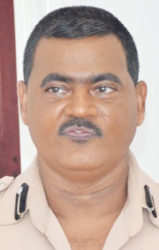Minister of Public Security, Khemraj Ramjattan has sought legal advice from Attorney General, Basil Williams following a dispute between Commissioner of Police, Seelall Persaud and former acting Commissioner, David Ramnarine over a number of promotions made by the latter.
“I don’t want it to be in the press quite frankly. I will give a decision after getting a legal opinion on the matter from the Attorney General and that is all my comment,” Ramjattan told Stabroek News when contacted yesterday.
Commissioner of Police Seelall Persaud went off on some of his accrued vacation leave in June of this year and returned to work this month.
This newspaper was told that upon his return and analysis of work done by his replacement, Ramnarine, he noticed that some ranks had been promoted and he felt that the promotions did not go through the appropriate legal process.


His objection to the process was that Ramnarine was not appointed by the President of Guyana to act in the capacity and as such he could not make the promotions. Therefore, Persaud wrote to the respective administration officers for the ranks’ promotions to be rescinded.
When contacted, it was Persaud who pointed Stabroek News to the Minister of Public Security for all queries.
Ramnarine on the other hand, pointed to Persaud saying “Ask the Commissioner.”
This newspaper was told that Ramnarine was appointed to act as Commissioner by Ramjattan who would have informed the President of the decision.
“How did he think he got there? Did he just on hearing that Seelall is on leave take up himself and say ‘Well I am going to act’? No. Things do not operate like that in the force,” a source said.
The source says that Persaud pointed to the Constitution of Guyana in his argument that the promotions be rescinded but that it contradicts his arguments.
Article 211 of the Constitution of Guyana states that “The Commissioner of Police and every Deputy Commissioner of Police shall be appointed by the President acting after consultation with the Police Service Commission.”
It adds, “If the office of Commissioner of Police is vacant or if the holder thereof is for any reason unable to perform the functions of his office, a person may be appointed to act in that office and the provisions of the preceding paragraph shall apply to such an appointment as they apply to the appointment of a person to hold that office; and any person appointed to act in the office of Commissioner of Police shall, subject to the provisions of paragraphs (3) and (4), continue to act until a person has been appointed to that office and has assumed the functions thereof or, as the case may be, until the holder there of resumes those functions.(3)Subject to the provisions of the next following paragraph, the Commissioner of Police shall vacate his office when he attains such age as may be prescribed by Parliament.”
Article 232 of the constitution also says that unless it is otherwise provided or required by the context “A reference to power to make appointments to any office shall be construed as including a reference to power to make appointments on promotion and transfer and to confirm appointments and to power to appoint a person to act in or perform the functions of that office at any time when the office is vacant or the holder thereof is unable (whether by reason of absence or infirmity of mind or body or any other cause) to perform the functions of that office; and (b) a reference to the holder of an office by the term designated his office shall be construed as including a reference to any person for the time being lawfully acting in or performing the functions of that office.”
It says also that the validity of the performance made the person acting in the specified capacity cannot be questioned in court. “Where by this Constitution any person is directed, or power is conferred on any person or authority to appoint or elect a person, to perform the functions of an office if the holder thereof is unable to perform those functions, the validity of any performance of those functions by the person so directed or of any appointment or election made in exercise of that power shall not be called into question in any court on the ground that the holder of the office was not or is not unable to perform the functions of the office,” the constitution reads.







